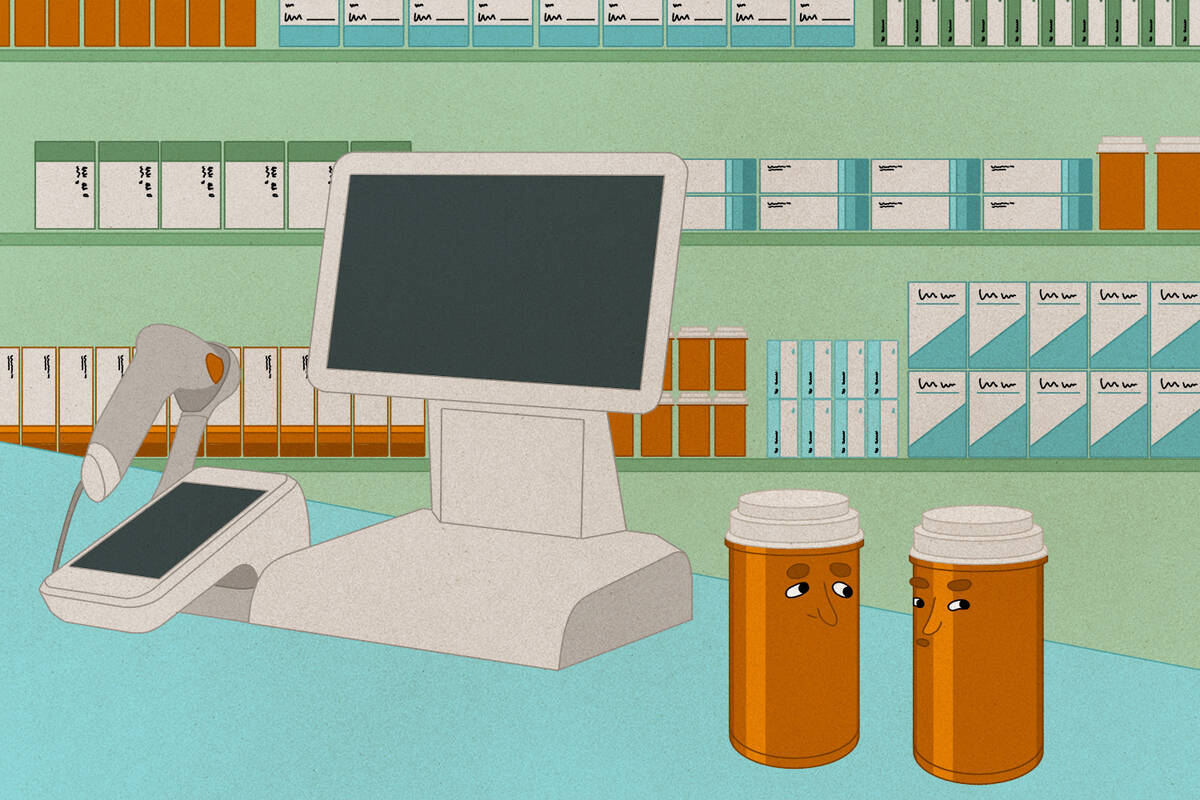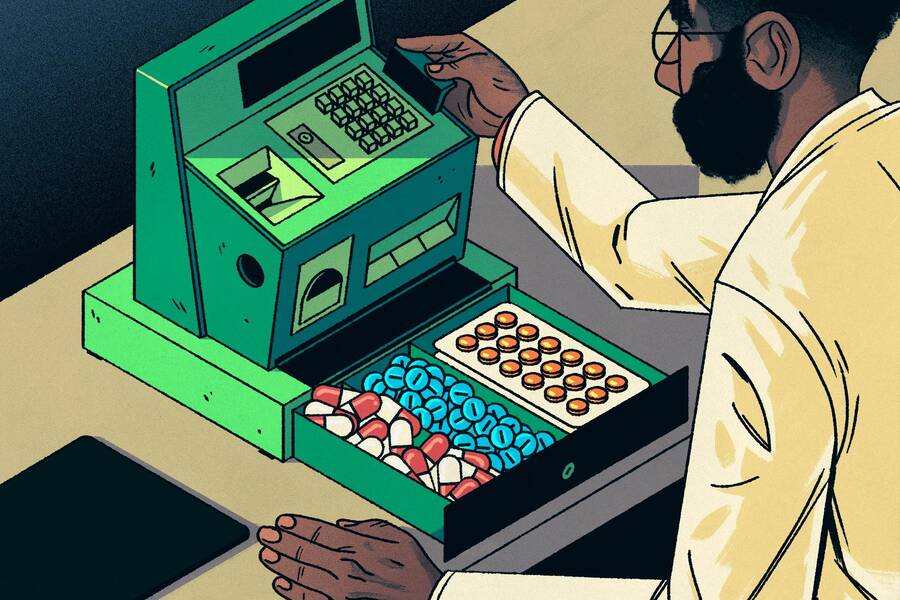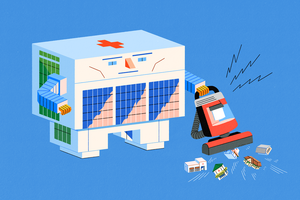Healthcare Jun 1, 2022
Consumers Pay When Generic Drug Companies Collude. Here’s a Way to Stop Them.
Price-fixing by pharmaceutical cartels can cost billions, and the threat of lawsuits isn’t enough to deter it.

Lisa Röper
What do canned tuna, auto parts, and turbine generators have in common?
They are all products made by companies that have been prosecuted for price-fixing by the U.S. Department of Justice. In effect, industry players were acting as a cartel, colluding to set high prices.
While the idea of a cartel may bring to mind shadowy groups distributing illicit products, the concept relates to everyday business too. “This isn’t always sophisticated criminals and dark alleys,” says Amanda Starc, an associate professor of strategy at the Kellogg School. “And, in this case, they’re really bad at it.” But it’s still a crime with large negative impact on consumers, who get stuck with higher prices than natural competition would yield.
As a healthcare economist, Starc was interested in how cartels might impact drug pricing. This was at the heart of a 2020 DOJ case against Teva Pharmaceuticals for its efforts starting in 2013 to raise the prices of generic drugs in coordination with other pharma firms. The DOJ case is ongoing, though the company paid $420 million to settle a suit brought by investors without admitting wrongdoing.
The intended benefit of generic drugs is, of course, that they cost consumers less. The alleged Teva collusion—which the government claimed was conducted by email, LinkedIn messages, in-person conversations, and other means—led to generic-drug price increases costing consumers, insurers, and the government hundreds of millions or even billions of dollars.
The case and related documents enabled Starc and collaborator Thomas Wollmann of the University of Chicago to study the dynamics of cartel behavior: not only how it affects prices, but what might curb collusive behavior among drugmakers.
There are two possible ways this could happen, Starc says. A cartel member could go rogue and set lower prices. “But in this industry, other members would find out right away, so that’s not going to happen,” she notes. Or, more likely, a new firm could enter the market that’s willing to set lower prices.
“If there’s no entry,” Starc says, “consumers are going to be in big trouble, potentially for a long time.”
By studying Teva’s alleged collusion, the researchers showed that when certain drugs are targeted by cartels, prices for those drugs increase—as does the number of new companies entering the market to manufacture that drug. While the increased entry eventually brings prices back down, it can take years, in part because of FDA delays for new-drug applications.
Starc suggests that reducing FDA delays, or even shifting new-drug application costs to taxpayers, could reduce price-fixing significantly: “It’s about making markets more competitive, and better for consumers.”
Comparing Cartelized and Non-Cartelized Drugs
The researchers compared segments of the generic-drug market where Teva was alleged to have used cartel behavior with those where it had not engaged in such behavior.
“We knew there were a bunch of markets in which Teva is active but chose not to form a cartel,” Starc says. “It had everything to do with where Teva executives knew people.” For example, evidence of price-fixing was seen in drugs for cancer, arthritis, and hypertension, but not in products for some other conditions.
“I’ll paraphrase a good quote from the legal complaint: ‘Collusion is hard to initiate but easy to maintain.’”
— Amanda Starc
That enabled a natural experiment of how cartel behavior influenced both prices and firm entry. They studied the quantity of generic drugs sold based on prescriptions, primarily from Medicaid; point-of-sale prices for drug products; and firm-entry patterns based on new drug applications filed with the FDA. The dataset researchers built covered the period from 2008 to 2019 and included over 400 drugs.
Increased Prices, Delayed Entry
As expected, the researchers found that generic-drug prices rise significantly in the areas where cartels allegedly formed. The authors write, “collusion leads to abrupt price increases, which average 40-50 percent.”
Moreover, “the prices stay pretty high, even after the complaint was filed,” Starc says. “I’ll paraphrase a good quote from the legal complaint: ‘Collusion is hard to initiate but easy to maintain.’”
She elaborates: “Once the cartel executives reach a new price level, they don’t have to talk to each other, or play golf, or go to girls’ night out in order to make this work. They just keep the prices where they are. So somebody has to come in to disrupt that or prices are going to stay high, even once the DOJ is knocking at your door.”
But there was good news, too. The study did reveal an increase of new entrants in cartelized markets. Following collusion, 30–40 percent more new-drug applications were filed with the FDA than in non-cartelized markets.
This ultimately brought prices down, but the decrease happened slowly. “We shouldn’t expect prices to immediately go back to where they were before the cartel,” Starc says. That’s because new entrants arrive partly to take advantage of the high margins cartelized markets represent, so they set prices just slightly below those of incumbents initially, with natural competition lowering prices over time.
But researchers found that industry economics weren’t the only factor driving the delay in lower prices. A large FDA backlog for drug-manufacturing applications was also to blame.
“Firms that tried to enter these markets got delayed on the order of magnitude of years, not months,” Starc says. “And every month that ticks by is a month in which consumers are facing elevated prices.” Indeed, by the researcher’s calculation, the average delay was two years. They also found that a reduction of regulatory delays by one to two years could mean up to $1.5 billion saved on generic drugs for consumers.
An Effective (but Unpopular) Solution
So what’s the best way to combat cartel-based pricing in generic drugs?
Legal action—in the form of antitrust enforcement—is important, but not enough, Starc suggests. “The reason it’s insufficient is that we know that prices are going to potentially stay high even after enforcement because of the ‘hard to initiate, easy to sustain’ idea,” she says.
A more comprehensive approach would make it much easier for firms to enter the markets in question. “That’s not the antitrust authority’s job but the FDA’s,” Starc says.
Because it may be challenging to motivate the FDA to work faster, Starc offers an innovative, if potentially hard-to-sell, route to easing entry. “The FDA charges application fees to companies to get approval for entry, and that helps fund the agency but might limit entry. It might make sense to just fund the FDA out of tax dollars and not charge application fees,” she says. This would allow the FDA to hire more people to expedite review. “We’d get more entry, and the added competition would lower the price of drugs for consumers enough to offset any additional taxes”—as suggested by the billions in consumer savings the research uncovered.
“American taxpayers should be pretty happy about that deal,” Starc says. But she recognizes the challenge of asking people to pay even a penny more in taxes: “It’s probably my least popular policy proposal ever!”
Still, it’s a better plan than just hoping widespread cartel behavior somehow stops on its own. “We’ve seen the antitrust authorities go after a number of cases across industries. And those are just the ones they catch,” she says. “So we have to do whatever we can to make markets competitive and lower barriers to entry. If they know someone’s immediately going to come in and undercut them, they have less incentive to conspire to raise prices.”
Sachin Waikar is a freelance writer based in Evanston, Illinois.
Starc, Amanda, and Thomas G. Wollman. 2022. “Does Entry Remedy Collusion? Evidence from the Generic Prescription Drug Cartel.” Working paper.



